#nobody @ me i have in-text citations for why i think this friendship would work
Text
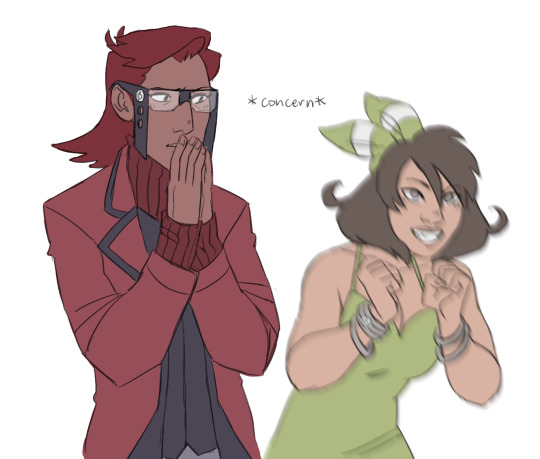
this is basically the vibe of the oras oneshot i'm writing right now
it's 7 am and she's three energy drinks deep and he's in need of ibuprofen
[i have commissions open now]
#trainer may#magma leader maxie#pokemon oras#pokemon omega ruby#oras#pokemon#autumn.art#your honor i just think they should be pals#seriously this oneshot is so sappy it's literally just may making a friend (or two)#nobody @ me i have in-text citations for why i think this friendship would work#like what is the battle maison multi challenge if not an opportunity to hang out with my good pal uhhh former ecoterrorist maxie lastname
121 notes
·
View notes
Text
Madoka Magica isn't a deconstruction
As a subject, Mahou Shoujo is, in my opinion one of the most misunderstood and yet widely adopted genres in anime.
Being a regular fan, you can know about its presence like that of Super Robot and Battle Shounen- and yet have no insight into its role as one of the eldest genres on the scene.
Many viewers simply don't find interest in watching a feminine, almost voyeuristic take on dramatized child adolescence, which is totally fine. (Doesn't make you any less of a fan of the genre either if you’re of the male persuasion and aren't there for those themes. All power to you!)
However, when it comes to analyzing such genre steeped shows, like that of Sailor Moon or Little Witch Academia- those without the wide understanding for which their structures are based can make unfair or miscalculated conclusions of what those stories communicate.
This is the exact quandary that Madoka Magica poses for such analysis and why I don't consider it a deconstruction of the Magical Girl genre.
Mahou Shoujo, or Magical Girl is a term assumedly coined by that of Mitsuteru Yokoyama and Fujio Akatsu-ka, creators of Mahoutsukai Sally and Himitsu no Akko-chan; firsts of the genre, bench marking its creation in the early 60’s.
(I say “assumedly” as I can't find anything divulging the cut and dry fact. Hit me up if you have the actual source with citation.)
The genre has many subsets, but for the sake of your time we’re going to focus on the most popular and prolific of the Magical Girl Sub-genres, Magical warrior. There are some key components that make a show “magical warrior”.
1.) Have the protagonist or other female characters gain/have the ability to transform into an alternate, enhanced version of themselves.
2.)The presence of a magical companion, whether that be a animal or object that accompanies the protagonist in her magical endeavors.
3.)Items that assist in either the transformation process or battle for the protagonist
4.)An adversarial force threatening the lives of the protagonist, their friends, society and or existence itself
Its is of note that while a transformation is a must for this sub genre, the other factors can be all present or sparsely.
In Cardcaptor Sakura for instance the main character, Sakura Kinomoto doesn't traditionally transform but rather changes her clothes. However she still uses a magical item, is accompanied by Kero and works towards a goal that threatens the lives of those around her or her way of life.
(Arguably Sakura's “transformation” is just that because she transforms her mindset when changing outfits to better suit her magical endeavors.)
Along with those structural linchpins, Magical Warrior-centric shows are known for their glamorous, long-winded transformation sequences, teenage leads, handsome love interests, revealing outfits and normalized use of cute, bright and feminine iconography.
On the subject of how Madoka supposedly “deconstructs” these shoujo conventions common to the genre, with its “dark” tone and DEATH and despair- it simply doesn't work because modifying elements of a genre and subverting audience expectations doesn't mean your critically taking apart the framework.
But you must be asking by now “well Mirage, if twisting elements of a genre isn't Deconstruction then what is?”
Jacques Derrida was an accomplished french philosopher of the early 20th century. You can see his fingerprints all over, influencing how we study subjects embroiled in the arts and social sciences. He found that the meaning many authors and scholars claimed to see in stories were inherently arbitrary or transient.
Generally speaking, Derrida’s theory of deconstruction, (or post structuralism) deals with the mental form of which meaning takes- form. Although we perceive meaning in a text such as, let's say Evangelion or Welcome to the NHK- such meaning isn't structurally sound. A lot of deconstructive analysis focuses on the words and language we use in describing- communicating those thoughts and how they are, in their own form- failures.
Tim Nance has a fantastic video on explaining in laymen’s terms what the act of deconstruction is, I highly suggest you pop over and listen to his video. For now I will simply relay that of his points on the process of which someone deconstructs a text.
Find meaning
Identify tensions
Identify the ways that those tensions seem to be unified by meaning
Deconstructing the tension
Then unity falls apart
Then the meaning doesn't mean anything anymore.
So a Hypothetical; Hameru is chasing Kyuubei down a corridor.
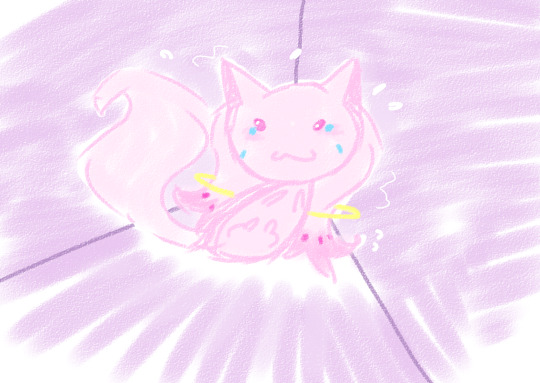
Cornering the demon rat creature, she pulls a gun from her shield.
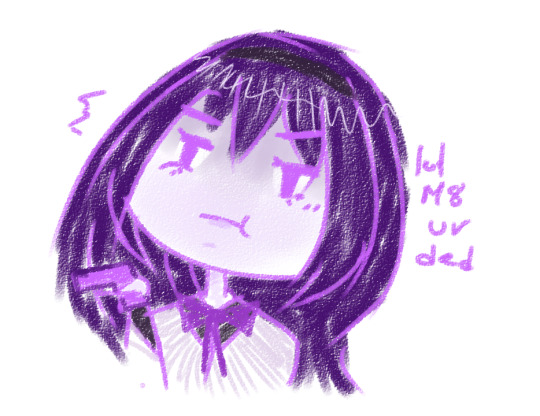
Before Homura can muster the greatest of head tilts, Kyubey yells “Homura, no matter what you do magical girls and their wishes cannot exist without the creation of witches and their curses!”
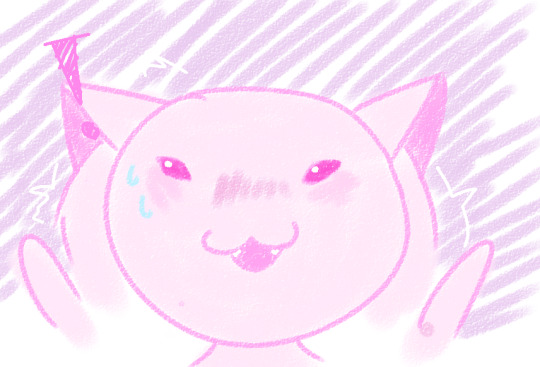
However Hameru being the dimension-skipping cynic we all know and love doubts this, arguing that “you can't know the intent of which causality occurs, Incubator. You may think that being a magical girl ultimately means being a witch but you can't know that for sure because hope is not guaranteed to falter to despair.”
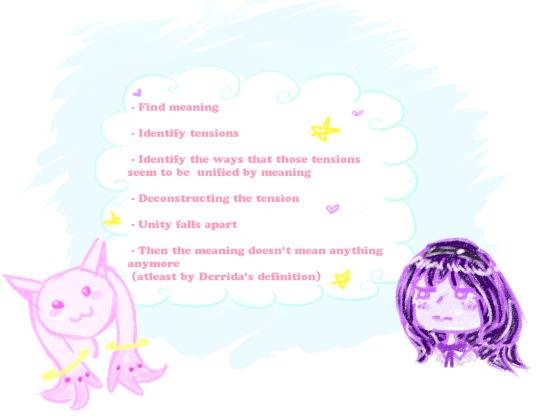
Kyubei asserts to Homura that its is impossible for witches and Magical Girls to not exist together through the Cycle of Entropy, forwarding their meaning in the knowledge perceived. Homura then identifies the tensions of such a statement, and their unity.
She understands that Kyubei believes the two to be omnipresent however questions if it's necessarily true, stating that hope doesn't necessarily need despair.
By deconstructing the tension, the structure of Kyubey’s statement falls apart and loses its meaning.
When I refer to Madoka as not being a deconstruction, its as a genre deconstruction. Instead of words, we cut down to a set of trappings and conventions that cement the subject and go about playing those elements as they would in the real world, then commenting on the genre as a whole.
While undoubtedly Madoka uses the ingredients of Mahou Shoujo, it doesn't necessarily comment on the way in which those trappings are when deconstructed. Rather it simply changes the shades of pink and white to purples and blacks.
It points out that the form the genre is known for is problematic and pushes the shape of events to a far darker place. But it doesn't take that point any further than that, focusing rather on its themes of selfishness vs selflessness.
In the case of deconstructing the genre what conversation does that start?
If it was as deconstructive as people claim, Madoka would’ve elaborated more on, lets say its themes of utilitarianism through Kyubei or Feminism regarding the witches as a whole.
Madoka has a female cast, a mascot character, transformation items and weapons, a cosmic big bad and trucks full of cute, fairytale imagery paired with its stark depictions of despair and death. It's not an outlier for its themes but rather the boundaries it's willing to push.
I think this issue is less of a problem with the show and more its fanbase. Madoka isn't deconstructive, its subversive, turning the expectations of common viewers upside down. (Again, note i’m saying subversive and not subversion.)
When ads started popping up on social media in 2011, not many people were expecting anything other than that of the “standard fair”. They were fairly innocuous, toting typical character slates and a new ClaRis song. Nobody seemed to care all that much outside of magical girl trash like myself. Then when fans of the genre saw the cool direction the show was heading as it aired, they shared it with others. Eventually a swath of anime fans Came to sing Madoka’s praises.
But as the internet is, when communities started coming together to dissect the show somebody threw the word deconstruction into the mix and now we’re here.
One thing people bring up in defense of the deconstruction argument is that Madoka features a collection of irrevocable character deaths, not recouped by the power of friendship. And while this is technically true I don't understand what makes this qualify as deconstructive. Many of the deaths in Madoka end up just as friendship fueled, and arguably less meaningful in context of the multiple universe dilemma.
For better or worse you get it; But still may be asking- what's the problem with Madoka being considered a deconstruction in the first place?
This is a rather daunting question because while it seems to be a non-issue, it affects not only the way we perceive deconstructions but that of the shows titled as such.
I want more people to get into Magical Girl-centric anime but those who label Madoka as superior to that of its predecessors stop potential fans from being created.
Believe it or not Mahou Shoujo is a much more flexible genre than it looks, capable of tackling difficult themes like that of abuse, love, identity and growing up.
Saying Madoka is contrary to the genre as a whole rather than being a darker take greatly limits what Magical girl as a concept is able to be. It harmfully obscures the shows that have celebrated and deconstructed the genre while simultaneously denouncing the messages they convey as “frivolous girly redundancy”. And that's the last thing Mahou Shoujo is.
youtube
#Madoka#Miragephan#puella magi madoka magica#mahou shoujo#analysis#anime#magical girl#deconstruction#Jacques Derrida
101 notes
·
View notes